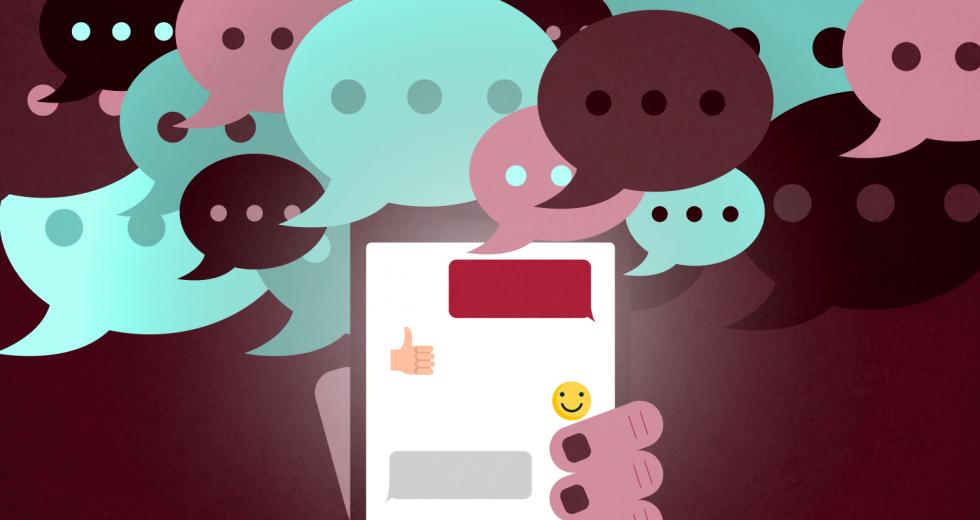In the rapidly-changing world of digital communication, there are times when new communication tools and technology introduce liabilities that may not be completely obvious to employers. Today’s workforce, especially millennials, has clearly embraced messaging as a primary form of communication, whether via online or app-based chat services or text messaging — and it’s of course happening in the workplace. Whether employers like it or not, employees around the world send and receive billions of messages every year while they’re working.
The appeal and advantages for using real-time messaging, versus other methods like email, are easy to spot. It allows workers to address issues on the fly with minimal disruptions, promotes and helps facilitate communication with management who may not give timely responses to emails, and it can be extremely beneficial when it comes to questions that require an immediate response.
For example, if you’re on a telephone call and need a vital piece of information, a quick message to a colleague can allow you to obtain the information quickly, silently and without interrupting the call. Most employees use their phones to text when they are away from their computers in the workplace even if texting is not an authorized company form of communication.
With all the apparent efficiency messaging affords, employers might find themselves wondering what risks and liabilities it poses. In general, messaging is a more informal method of communication, which often leads to a false sense of security or lack of forethought, and has the potential to create legal exposure. It also opens the door for mistakes, by saying the wrong thing or leaving room for the wrong interpretation.
Recently, there have been several highly publicized cases that identify the risk of employer liability. In a recent class action lawsuit, Uber allegedly sent mass SMS messages to people who had not opted to receive those communications. Uber denies the allegations, but is expected to pay $20 million to settle the suit related to improper use of texts. Wells Fargo, on the other hand, is currently embroiled in a sexual harassment lawsuit which, among other things, alleges one of its managers sexually harassed an employee through the company’s instant messaging system.
The liability isn’t any less for public entities. In 2017, the California Supreme Court decided unanimously that communications made or stored on a public employee’s personal account, including emails sent from a personal account and text messages sent from a personal telephone, may be subject to disclosure under the California Public Records Act.
The informality of messaging can even lead to claims of breach of warranty and fraud. Here’s an example of a text exchange between a salesperson and a customer, regarding assurance of a product that could lead to liability:
Corporate purchasing department text: “Hey, are you sure your product will maintain performance for the next 15 years bc a lot is riding on this?”
Corporate seller text response: (thumbs up emoji)
When you shift the communication method to email, you get a different outcome — one that is more informative and limits liability:
Corporate purchasing department email: “Good afternoon, would you please confirm in writing that your product will maintain performance for the next 15 years. Our company’s future depends on it.”
Corporate seller email response: “I can confirm the product normally does perform for 15 years, however, it is only warrantied for 10 years and we cannot make claims beyond that timeframe.”
Or, “I believe that’s the case, but I’ll check with my legal department and get back to you.”
The speed of messaging, its simplicity or how fun those damn emoji are to use, encourages people to make statements or infer claims through texts and messaging they would not typically make in email or printed material, and that poses a major risk to employers.
Employers need to consider how they will obtain, review and be able to preserve employee texts in the same manner they do emails. In the case of a dispute, all relevant instant messages and texts made on the company email system and server will very likely be fair game. If texts are made from company telephones, the demand to produce those records will likely be well-founded. However, when business-related texts are sent or received on employees’ personal devices, the issue becomes more complicated. Employers typically don’t have access to an employee’s texts and do not have automatic systems in place to preserve them.
As an employer, consider reaching out to employment counsel to seek guidance on implementing an applicable policy to safeguard the company, if you have not already done so. Some industry experts predict instant messaging will replace email in the near future as millennials move up the management ranks, and it’s important to be prepared.



